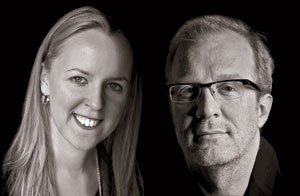
Marisa Wegrzyn and Tracy Letts launched their careers a generation apart, but they’ve got a city in common. We asked Wegrzyn, 29, a founding member of Theatre Seven, and Letts, 45, a Steppenwolf ensemble member who appears in Who’s Afraid of Virginia Woolf? in December, about their adamant allegiance to making Chicago their artistic home.
Tracy, you grew up in Oklahoma, came here at 20—no formal theatre training, no college degree, no experience, no contacts. Why Chicago?
LETTS: I was following a girl. Summer of ’85. I responded to the scene here immediately. I liked that the theatres were mostly small, funky storefronts. I loved that it didn’t take a lot of money to produce a show.
Marisa, you grew up in Wilmette. You came to Chicago with a BA from Washington University in St. Louis, and you already had some theatre awards on your resumé from competitions you’d won as an undergrad.
WEGRZYN: After college, coming here was the default thing to do. And I had one contact, a professor who introduced me to Ed Sobel [then Steppenwolf’s director of new play development]. So I met him and I said, ‘Hey, by the way, I’ve got this play I wrote in my back pocket. . . .”
So you both have a strong Steppenwolf connection.
WEGRZYN: Ed got Steppenwolf to do a reading of Psalms of a Questionable Nature. And then The Butcher of Baraboo was part of the First Look Repertory festival in 2006.
Tracy, your Pulitzer-winning play, August: Osage County, got its start at Steppenwolf, too. Did you have an affinity for Steppenwolf from the beginning?
LETTS: No. I fucking hated them for years. I submitted Bug to them, and they rejected it. I was like, “How dare you not do my play?” They all know now how I felt then. They’re like, “You were really angry back then. What was your problem?”
What was the problem?
LETTS: I don’t know. I was angry. Also I was drinking all the time.
What changed?
LETTS: Well, I’ve been sober for 17 years, so that changed. Quitting drinking made it easier to write.
You both have home companies. How does your life change when you become part of an ensemble?
WEGRZYN: You always have someplace to go to where people are excited to read your work. Otherwise, it feels like you’re throwing your scripts out into a black hole.
LETTS: Here’s the skinny with Steppenwolf. They tell you you’re a member of the ensemble. Then—nothing. No secret handshake. No decoder ring. No sheet of procedures and obligations. Being a member of the ensemble means you will receive consideration for roles when the season is put together. And now when I write a play, I know they are going to read it.
You’ve both also won some pretty big awards—Marisa’s $25,000 for the Wendy Wasserstein prize—
LETTS: Wait—the Wasserstein’s $25,000? The Pulitzer’s only fucking $10,000.
Tracy, what advice would you give somebody starting out with dreams of becoming a playwright?
LETTS: My advice would be come to Chicago. I can’t imagine a better place for a young playwright to be. That’s not boosterism. In New York, it’s not economically feasible for theatres to take risks on new plays. But in Chicago, you can always get the work done. You can get produced here even if nobody’s ever heard of you. It might take a while, but you absolutely can get produced here.
Photography: (From left) Steppenwolf; Caitlin Hazelton



